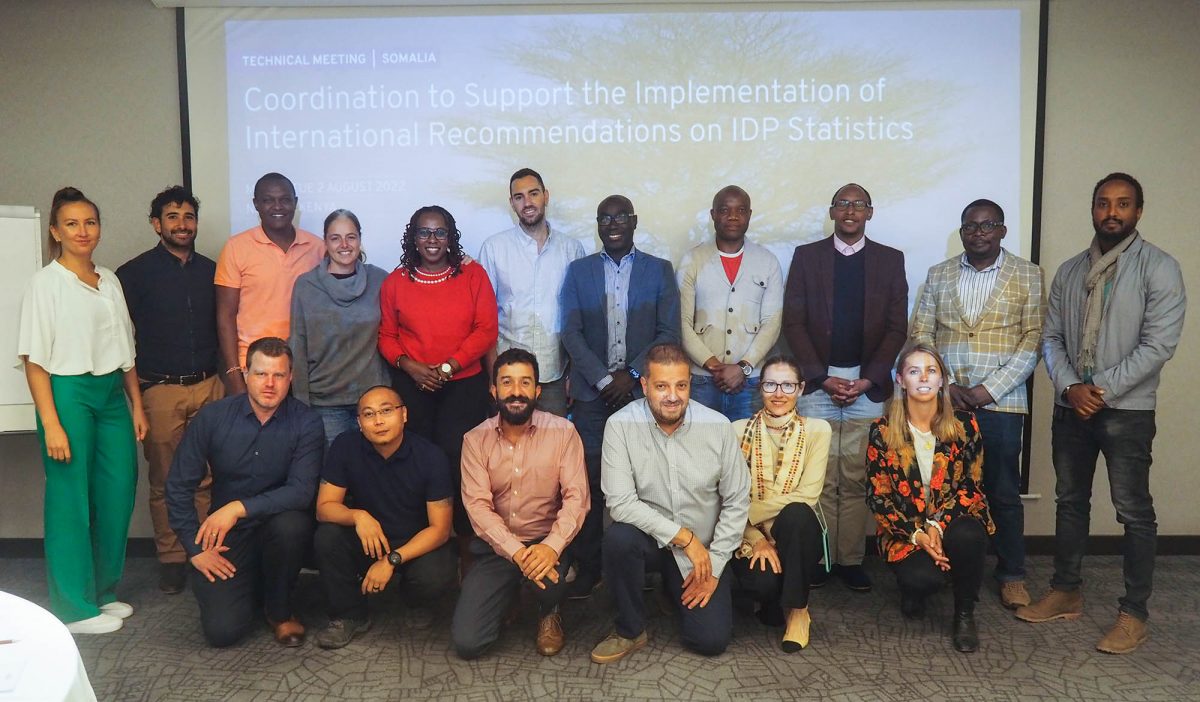Nairobi, August 1 and 2, 2022
The Government of Somalia is progressing towards increasing its capacities on national statistics and analysis on displacement to strengthen government leadership on durable solutions for those affected by forced displacement. The international community plays a key role supporting the statistical production around forced displacement which can further serve to inform humanitarian response. As addressed in the National Development Plan 9 (NDP-9), 2020-2024, the lack of physical safety, both from conflict and natural disaster, have impacted more than 2.4 million Somalis, exacerbating the impacts of poverty. Furthermore, prioritising durable solutions for long term displacement is a cross cutting imperative of the strategy framework of the NDP-9.
The Somalia National Bureau of Statistics (SNBS), established in 2020 by the Somali Statistics Law No. 24, is leading on the development of a National Strategy for the Development of Statistics NSDS, 2018-2023. In this quest, in May 2021 the SNBS requested support to the Expert Group on Refugee, IDP and Statelessness Statistics (EGRISS) to implement the International Recommendations on IDP Statistics (IRIS) and develop a stand alone IDP statistics sector strategic plan that helps to build a National IDP Statistics System and contributes to strengthening evidence-based public policy and national responses to displacement in the long term, by increasing the visibility of internal displacement.
As highlighted in the report of the High-Level Panel on Internal Displacement, the work underway through the EGRISS can offer an important platform for coordinating capacity development efforts for national statistical systems on forced displacement statistics. A prerequisite for the inclusion of IDP statistical production in the scope of the NSDS in Somalia, is the establishment of a thorough understanding of the requirements IRIS poses on the production of official IDP statistics as well a thorough information landscape mapping related to existing data sources for IRIS implementation.
On Monday 1st and Tuesday 2nd of August, EGRISS and JIPS convened a technical meeting in Nairobi. The aim of the meeting was to promote a hands-on and technical discussion around the production of national statistics on internal displacement in Somalia. The meeting is part of EGRISS’ technical support to Somalia for the implementation of the International Recommendations on IDP Statistics (IRIS). Requested by the Somalia National Bureau of Statistics (SNBS) in May 2021, the support also involves the development of a standalone Statistics Sector Strategic Plan on IDPs, as part of the National Strategy for the Development of Statistics (NSDS) currently being elaborated. JIPS is leading the technical support provision on behalf of EGRISS, as per agreement by the EGRISS Steering Committee in December 2021.
The technical meeting builds on several earlier exchanges and consultations that took place between the EGRISS Subgroup 2 on capacity development, the SNBS, and other government entities as well as in-country teams from the international community. For the first time, however, the different actors came together in-person for a 2-day working session to develop a shared understanding of the IRIS, the existing data ecosystem on internal displacement in Somalia, and on how the international community can best support government-owned statistics on internal displacement. The technical meeting thus marks an important step in the ongoing process of EGRISS’ support to the Government of Somalia.
During the session, there was an agreement to establish a dedicated forum to discuss official statistics in Somalia. A whole-of-government approach will bring together government actors responsible for providing solutions to displacement, the national statistical authority in the country as well as key stakeholders from the humanitarian and development sector and donors. This coordination should take place through the National Statistical System. It was also highlihgted and recommended that EGRISS members in Somalia should act as catalysts for the implementation of IRIS and collaborate with the government to build their capacity to lead on the process. Headquarter offices of EGRISS members in Somalia, represented by UNHCR, IOM, OCHA, UNICEF and UNFPA should promote technical exchange to develop capacity in their country-level teams and discuss context driven challenges to implement IRIS.
JIPS on behalf of EGRISS will continue leading on building capacity and providing technical support by coordinating a workshop with Government actors to raise awareness around the IRIS and identify opportunities for potential government-led data sources to support official statistics, continuing technical meetings with the SNBS to provide technical support on the upcoming data collection exercises led by the statistical authority and on the draft of a strategic plan for IDP statistics and promoting activities of capacity development on the IRIS across EGRISS members at international and country level in Somalia.
Relevant resources:

